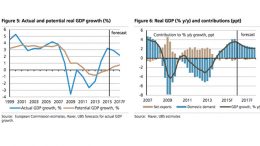Should Spain’s Banks Worry About A Debt Bubble Burst?
The Bank of Spain’s (BoS) Financial Stability Report usually puts its finger on the problem when it highlights the main risks affecting the banking business. As well as low interest rates and the deterioriation in both Spanish and global economic prospects, the BoS’ latest report points to another factor which has not warranted so much attention: the decline in the prices of financial assets, both in fixed income securities and equities.










